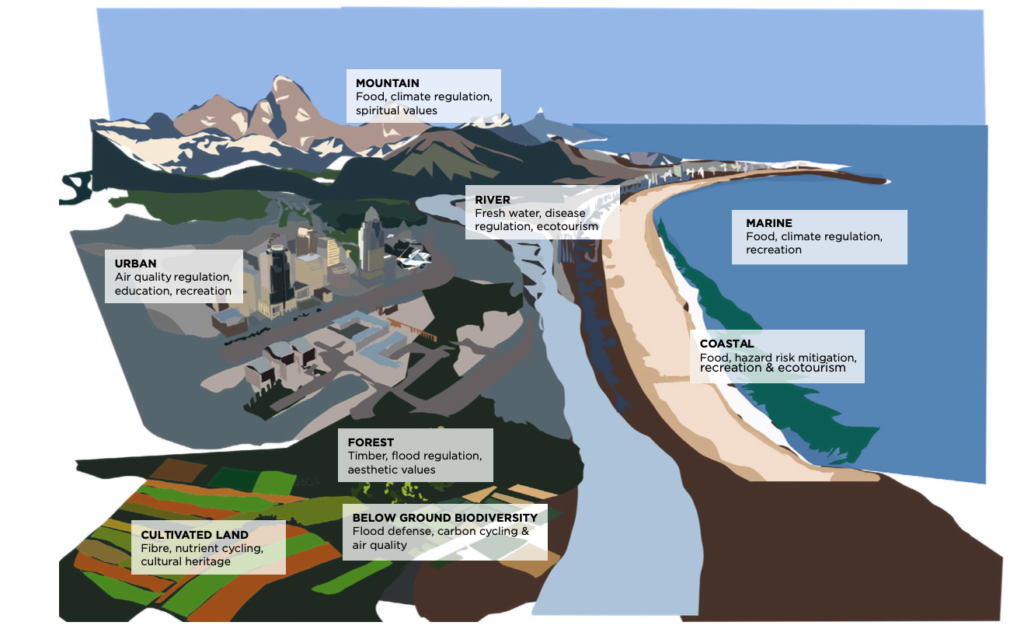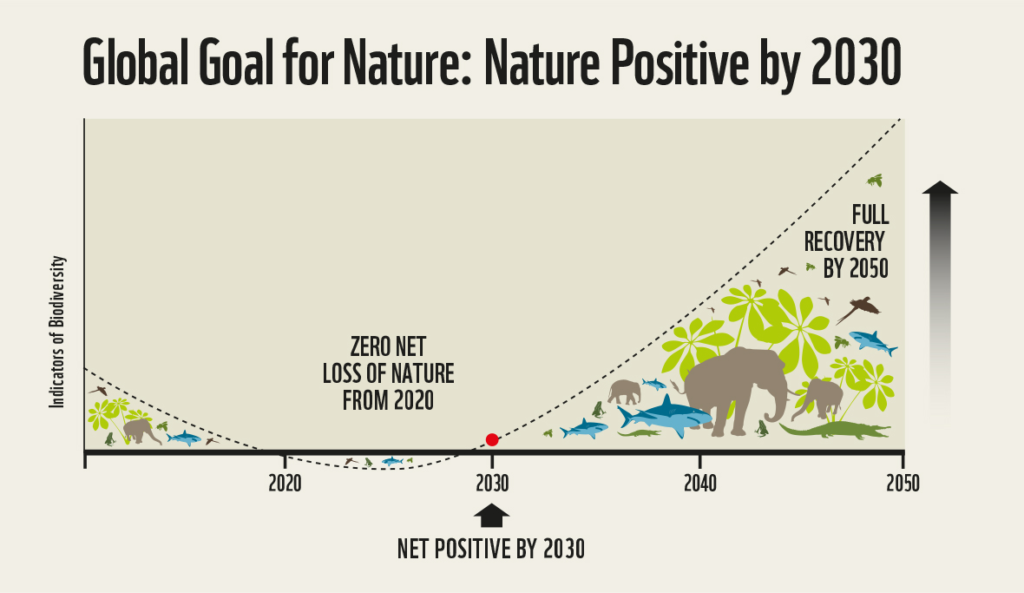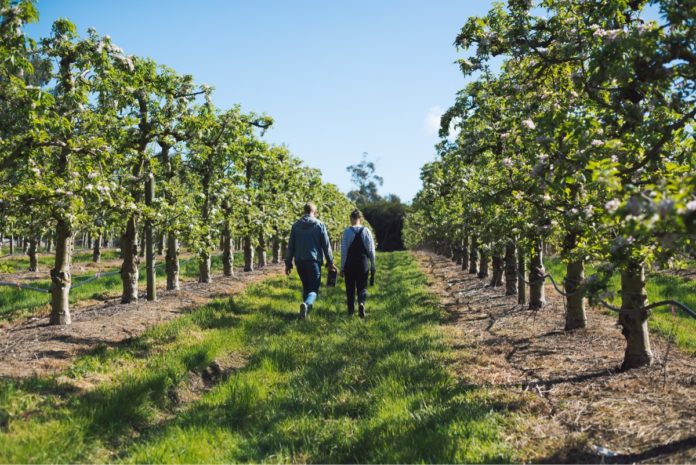Sometimes we take incredibly important things for granted. If we’ve always had something, how can we really deeply appreciate its value? Nature, in all its forms, underpins all life on this planet. All businesses rely on nature, some more than others. According to the World Economic Forum[1] more than half of global GDP, some $44tn USD is moderately or highly dependent on nature. Nature provides vital resources and services to business as well as some more intangible value. Let’s explore what nature positive means for business.
Take, for example, a paper and pulp manufacturer. It depends on well managed healthy forestry to provide raw materials for the core product. A food manufacturer depends on soil and water to grow ingredients; ecosystem services, such as pollination to fertilise plants and climate regulation to keep the temperatures, wind and rainfall consistent enough to farm. Take these resources and services away and the business becomes unviable and supply chains unmanageable. In turn relationships with customers and employees become untenable.
The opposite is also true, healthy nature enables healthy business. When nature is managed responsibly by the businesses that depend on it then it can regenerate, creating abundance and success for that business and the people who depend on it.
More intangibly we also receive mental heath benefits from time spent in the trees and the mountains [7].

Nature in decline
‘The most intellectual creature to ever walk Earth is destroying its only home’
JANE GOODALL
Local pressures from business operations, such as intensive farming causing nutrient imbalance and soil degradation, water pollution from manufacturing or habitat destruction from construction projects, decrease the ability for nature’s ecosystems to function.
Consequently these ecosystem services are not able to provide contributions to the well-being of human and animal life. Water and food security is threatened, leading to greater vulnerability in the face of disease and widespread financial losses.
Biodiversity is the variability amongst living organisms (such as animals, plants and fungi) within the natural world. This includes diversity within species and between species as well as ecosystems. Just as diversity in financial portfolios is desirable because it leads to resilience, the same is true for for nature. Diversity enables nature to be resilient to shocks and to continue to support life. Reduce biodiversity and all life suffers.
Tragically we are facing extinction rates of around 1000 times higher than background rates [2] Around the world, vertebrate and insect pollinators are observed to be under threat of extinction (with exceptions where their populations are managed [3]). The loss of pollinators alone could cost the global economy upward of US$500 billion per year[4].
As a result of these declines the in 2020 World Economic Forum placed Biodiversity loss as the 3rd most impactful and likely risk[5].
The drivers of loss
What is becoming apparent to all is the role business has played in the decline of nature. The five key pressures which drive this decline are[6]:
- land and sea use;
- direct exploitation of organisms;
- climate change;
- pollution;
- and invasion of alien species.
These pressures have originated from society and business, including:
- Unsustainable production and consumption patterns (e.g., fast fashion and food waste)
- Rapid population growth resulting in land use changes
- Trade relationships which place damage at arms length (e.g., outsourcing environmentally harmful production processes)
- Technological innovations that enable more consumerism (e.g., the rise of e-commerce)
- Systems of governance that enable unsustainable exploitation (like those that govern access to and ownership over natural resources)
Through recognising the pressures and drivers of nature and biodiversity loss we are able to manage them and begin to reverse losses.
What does nature positive really mean?
In recent months, especially since the Cop 15 summit we have heard more of the phrase ‘nature positive’ with governments and companies pledging to support act on nature. But what does this actually mean.
The concept, as the Cambridge Institute for Sustainable Leadership define it is:
Nature-positive is the term used to describe a world where nature – species and ecosystems – is being restored and is regenerating rather than declining.
A nature-positive economy is one in which businesses, governments and others take action at scale to minimise and remove the drivers and pressures fuelling the degradation of nature, to actively improve the state of nature itself and to boost nature’s contribution to society.
More specifically there is a Global Goal for Nature, agreed at Cop 15 in 2022 which aims to reverse nature loss since 2020 and achieve a net positive gain by 2030 with a full recovery by 2050.

An opportunity to regenerate
The good thing about nature and biodiversity is that it does regenerate. Brownfield land can be rewilded relatively quickly, bringing back native habitats which can support rich biodiversity. Eroded soil can recover through the implementation of lower impact farming techniques such as no-till or cover crops, ultimately improving the nutrients and quality of the produce. This presents a real tangible benefit to business, nature and society.

While many of the business methodologies and standards are being set, the science is established and there are many techniques that leaders can start using right away.
If a business wants to become ‘nature positive’ then there are some high level actions that can be undertaken.
- Assess – Measure, value and prioritize your impacts and dependencies on nature to ensure you are acting on the most material ones.
- Commit – Set transparent, time-bound, specific, science-based targets to put your company on the right track towards operating within the Earth’s limits.
- Transform – Avoid and reduce negative impacts, restore and regenerate, collaborate across land and seascapes, shift business strategy and models, and advocate for policy ambition
- Disclose – Track performance and prepare to publicly report material nature-related information throughout your journey.
“By bringing economics and ecology together, we can help save the natural world at what may be the last minute – and in doing so, save ourselves.”
David Attenborough
There are some excellent resources and frameworks to follow, such as the Science Based Targets for Nature (SBTN) and reporting standards from Taskforce for Nature related Financial Disclosures (TNFD) and the WWF Biodiversity Risk filter.
At the Sustainable Business Guide we’re developing more specific guidance for SMEs and if you are interested in working with us on this please get in touch.
Written by: Dave Caygill
References and further reading
[2] https://www.science.org/doi/abs/10.1126/science.1246752?sid=a4435a49-708d-44b5-9101-e5c5abf91eb0
[3] https://www.ipbes.net/sites/default/files/spm_deliverable_3a_pollination_20170222.pdf
[5] https://www3.weforum.org/docs/WEF_New_Nature_Economy_Report_2020.pdf



